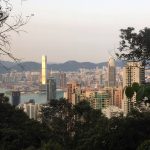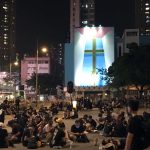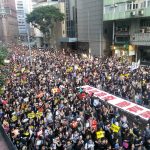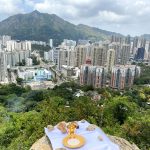Aventures missionaire – China
Points of view regarding the situation in Hong-Kong
Publié le 29/07/2020
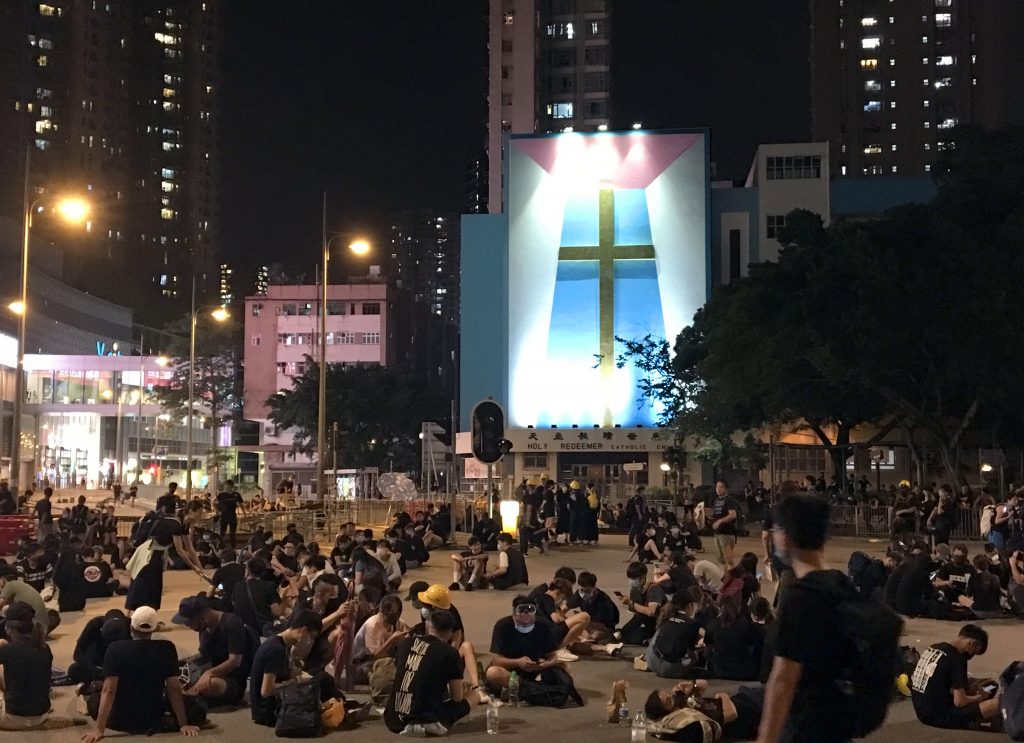
De jeunes manifestants sont assis devant la paroisse d’un père de Hong-Kong qui sera ensuite le lieu de violents affrontements avec la police
In your view, what are the reasons for the demonstrations in Hong-Kong?
James : The people of Hong-Kong see their society collapsing and feel invaded from all sides by China. They were concerned that if the extradition law in China had been passed, the individual freedoms of Hong-Kong people would have been further weakened. Earlier, there was a case that showed that citizens of Hong-Kong could be kidnapped and taken to China (the Causeway Bay Books disappearance). People in Hong-Kong were afraid that they too could ‘disappear’ and end up, who knows how, in China where they would be accused of some crimes. So the main reason for the large demonstrations is a total lack of confidence in the Chinese judicial system. But I believe there are also other reasons, including the distrust that the Hong-Kong people have long had for the government of Hong-Kong and the Chinese regime, their dissatisfaction with their judicial system, growing Chinese interference In Hong-Kong’s affairs, corruption in the Hong-Kong legislature, the disappointment and stagnation that followed the Umbrella Movement (2014), etc. Ultimately, the protests against the Extradition Law are the culmination of problems that have continued to accumulate.
As to why it was young people who were particularly affected by this issue, this is a very interesting phenomenon. Before this happened, many young people were ready to learn about Chinese culture, to watch Chinese variety shows and to frequent the establishments of mainland Chinese restaurant chains, and they cared little about politics. But today many young people have gone out to demonstrate. Some explain this movement by the fact that young people in Hong-Kong have no future prospects because of housing problems, the disparity between the rich and the poor and other economic concerns, but I do not think this is correct. First of all, those who demonstrated have stated clearly why they were doing soand they never cited any economic reasons. Second, most of the young people who have been demonstrating are students with a high level of education. It does not make any sense to say that they want economic benefits when they risk jail or even their lives. If young people have the courage to protest against injustice, even if they think their cause is hopeless (most people thought the law would be passed), it may be simply because they want justice.
Mary : I think that the causes of the movement against the extradition law can be roughly divided into long-term and short-term issues. As far as the short-term issues are concerned, the government suddenly announced the very controversial extradition law (逃犯條 例) in June of last year. The inhabitants of Hong-Kong were afraid that once this law was passed, personal liberties would be reduced by the option of extradition to China for unjust trials. Laws in China are different from those in Hong-Kong and the Beijing government has often accused dissidents of ‘crimes’ in order to be able to convict them. People in Hong-Kong were very concerned that once the law was introduced in Hong-Kong, China would interfere in its judicial system and liberties would be eroded as a result. As a consequence, the movement opposing the extradition law (反送中) began in June last year. This situation of growing disquiet was not always there. At the time of the reunification of Hong-Kong and China, many people in Hong-Kong had confidence in the basic law (基本法) and thought that China would allow Hong-Kong to enjoy considerable autonomy and would also allow the Chief Executive and the Legislative Council to continue to be elected in the long term by universal suffrage. However, as the years passed, Chinese control over Hong-Kong became stronger. When the Umbrella Movement took place, more and more people in Hong-Kong woke up and realised that they belonged to Hong-Kong, particularly the youth. This sense of a Hong-Kong identity, the desire of the people for social justice and their political conscience have all continued to grow. As a consequence, the objective of the movement is not just to demand that the government withdraw the extradition law, but also to achieve liberty and democracy for the long term.
‘Liberate Hong-Kong, revolution of our times’ (光復香港, 時代革命) is the most widely used slogan in the movement. It can be interpreted differently but in general it means the determination of the people to ‘liberate’ and to protect Hong-Kong. In addition, police violence has enormously repelled the Hong-Kong population. Right from the beginning of the movement, there have been so many examples of excessive force being used: many young people have been treated inhumanely, some have even been killed or have disappeared or have allegedly committed suicide.
How do you view this situation as Catholics?
James : This situation has led to deeper reflection and understanding of the Bible, in particular the attitude of Jesus in the face of persecution. Before, the story of his crucifixion did not affect me that much, but after having witnessed police brutality, the police beating and mistreating people in public [1], even raping [2] and killing citizens [3], I have come to understand the suffering of innocent people who are persecuted, held in the evil grip of the regime and experiencing brutality. So I am more aware than before of the pain suffered by Jesus during his Passion. At the same time, it is much more difficult to learn how to forgive like Jesus. How can I overcome my hate of others and pardon them? I do not understand this and I cannot do it. This too has undoubtedly had an impact on my faith. In the face of suffering, you ask yourself all the time where is God, why is he not helping us? In addition, there is a dissatisfaction with the diocese and the universal Church. I can understand that there may be issues to consider that are hidden, but personally I think that the Church could do more. Before I thought that the Church would speak up for justice, it would come to the aid of the persecuted and would want to protect the weak, whatever it might gain or lose. Now it seems that its only concern is relations with China, and it considers the situation in Hong-Kong as a taboo subject. All that Pope Francis has said in his message to the Chief Executive Carrie Lam that he is praying for her and for the people of Hong-Kong, that he wishes them peace and blessings, but he has never blamed the government of Hong-Kong. I can understand that there are many other problems in the world, like wars, natural disasters and large-scale humanitarian crises, and that perhaps, in the eyes of the Church, the situation in Hong-Kong is not a very serious issue. Compared to China and to the rest of the world, Hong-Kong is not even worth talking about. But this has undermined my confidence in the Church; it is as if, at the end of the day, all its talk of justice was just hypocrisy. The fact remains that the largest Church in the world did not dare to make a public declaration and it may be that all that an insignificant Catholic like myself has learned in the Church over the years was just empty words.
Mary : I would say that young Catholics are more optimistic than the average person. Faith has always been a pillar of my participation in this movement, because the justice we are fighting for is God’s justice. As Christians, we have to bear witness to Christ in society and to build the kingdom of heaven on earth. You could say that the past year has been a year of physical and mental exhaustion. In addition to studying and managing everyday affairs, having to experience every day the absurdity of this society has made me scared and angry. Every time I take part in a march or an event, I feel worried. On the university campus, at home, in church, I am afraid both for my security and that of those in the front line of the struggle and my morale is often very low. In those moments, my faith gives me great support, because it is Jesus who best understands suffering. In this way, last year, my faith has become deeper and I have prayed more. Having said that, like many young people, I have been unable to understand, let alone ask questions about, the attitudes and teaching of the Church. Many young people in the movement have come to use violence to express their demands. Although I do not approve of this, I understand how they got there. Our goals are the same, but the mode of expression is different. I admire their courage because they are ready to run the risk of being arrested or even killed while facing the regime. However, the Church has never advocated violent confrontation, so many young people on the front line have inevitably felt abandoned by it. In fact, as the violence in the confrontations escalated, the Church became less and less active, which has been a bit disappointing for me. The increase in violence is just the consequence of the growing despair among the young and this is just the time that the presence and support of the Church are most needed. Fortunately, several priests, as well as the Auxiliary Bishop Mgr Joseph Ha, have often expressed their support for young people and have even been seen in the vicinity of demonstrations trying to negotiate with the police, comfort young people, etc. These images remain deeply etched in me. So I remind myself that, even if I despair of the Church, I cannot despair of God. As a member of the Church, I also want to learn how to use my Christian identity to participate in the movement and to make it possible for those who are despairing to meet God.
How do you see the future of Hong-Kong and China? What are you hoping for?
James : Hong-Kong can only sink and will finish by submerging completely. Hong-Kong will continue to be attacked from all sides, whether it’s education, community activities, justice, economy or politics, all these areas will gradually be eroded by China. This is what the recent events have shown. This year, for the baccalaureate (DSE), it was a requirement to flatter the Communist party when answering one of the questions in the history exam[4]. In this way the educational system in Hong-Kong is being manipulated to become an instrument for political propaganda. Even if this question was removed, the future of very many students is uncertain.
The future of Hong-Kong depends on the population of Hong-Kong. If no one gets involved in the fight to protect Hong-Kong and no one resists its invasion on all sides by China, then Hong-Kong will cease to exist and will become a Chinese city like all the others, just keeping up some external appearances. There are two ways of imagining the future of Hong-Kong. One is that China uses immigration from the continent to clean out Hong-Kong (at present there are 150 new immigrants arriving in Hong-Kong each day), then will continue to eliminate dissidents, imposing the death penalty on citizens and deporting them from Hong-Kong. With immigration, the people of Hong-Kong will become a minority group that will eventually be sent into concentration camps like those for the Uighurs. Another possibility for the future of Hong-Kong is that people in the territory are saved by some international political crisis. There could be a third world war or an outbreak of disorder within China that would make it too preoccupied to deal with Hong-Kong. Those who had fled Hong-Kong could then come back. In the long term, people who are really from Hong-Kong could govern the territory and would not suffer Chinese colonial domination. Many people might die, but how can you imagine a better scenario?
One must not think that Hong-Kong will lead China towards democracy and liberty, as Hong-Kong is now mired in its own problems, without even thinking about previous decades when Hong-Kong thought it was more important than it actually was, thinking it might influence China, whereas it is China that has power over Hong-Kong. Most Chinese people do not want freedom even if they are rich. They have already been brainwashed and are making fun of those persecuted by the Chinese Communist Party. As a Hong-Kong citizen, I did not think this could happen to China but, in my opinion, decades of economic development in China have not made the country more open. On the contrary, repression has become worse at all levels; one example: even if China and the Vatican have signed a provisional agreement, that does not mean that China has adopted a more benevolent attitude towards Catholicism and the underground Church which, on the contrary, is even more persecuted and controlled than before. One should not hope that China will change, even if the Communist party should fall; the essence of the Chinese people will not change as Chinese people today are profoundlynationalistic. So even without the Communist Party, with those who will take power, the so-called People’s Republic of China will just become ‘The Chinese Empire’. The world should no longer view Hong-Kong as a state-of-the-art Chinese city that can help China move forward. To think so is to continue living in a delusion, as we have been doing for somedecades.
Mary : At the time of this interview, the Chinese government has just announced that it will vote to introduce the national security law in Hong-Kong next week. This would be an enormous blow for the liberty of Hong-Kong. We would not even have the freedom to express our views on Facebook. To say that there is hope for the future of Hong-Kong is to delude oneself and others. ‘Suffering produces perseverance; perseverance, character; and character, hope’ (Romans 5, 3-4). This is the Bible quote that came to my mind most often over the past year. The more violent is the repression, the more hope we should have. Over the past months, because of the coronavirus pandemic, demonstrations have been suspended, but I think they will soon start again. I hope that the desire and determination of the people of Hong-Kong for liberty and democracy will remain intact despite the challenges and suffering to come. The pandemic has also led the world to re-examine its relations with China and to understand the nature of the Communist regime. As a young person in Hong-Kong, I hope that more people in the world will pay attention to human rights, to the situation in Hong-Kong and in China and that they will not hesitate to call out injustice.
[1] The press was present during the demonstrations and, during 2019, pictures of bleeding demonstrators being beaten by the police while on the ground were regularly published live.
[2] In October 2019 an adolescent girl accused four officers of raping her in a police station on 27 September.The case has not yet come to court but the chief of police, who is in charge both of the police officers who have been accused and those in charge of the inquiry, announced that the complainant had no doubt lied in her witness statement and that she could be prosecuted for making false accusations.
[3] In addition to the accusations of violence that were filmed or photographed, as well as the death of Alex Chow who killed himself on 8 November 2019 by jumping from the third floor when he was trying to escape the police, demonstrators have added unproven accusations of murder by the police. In particular, they speak of the three dead during the attack on metro passengers in Prince Edward station on 31 August 2019. This attack left ten wounded, but the three alleged deaths, whose identity no one knows, are probably a rumour.
[4] The question asked for a comment on the following statement: ‘From 1900 to 1945, Japan brought more benefit to China than it caused damage.’ On the one hand, the question invites the student to list the atrocities committed by the Japanese in China, but it also makes an implicit reference to a text of Mao Zedong who, taking into account the fact that the Japanese occupation led to the accession of the Communist party to power, considered that, for this reason, it brought ‘benefits that were greater than the disadvantages’.
- La baie de Hong-Kong
- De jeunes manifestants sont assis devant la paroisse d’un père de Hong-Kong qui sera ensuite le lieu de violents affrontements avec la police
- Manifestation du 16 juin 2019 contre le projet de loi autorisant les extraditions vers la Chine
- Messe sur les collines au-dessus de Hong-Kong
